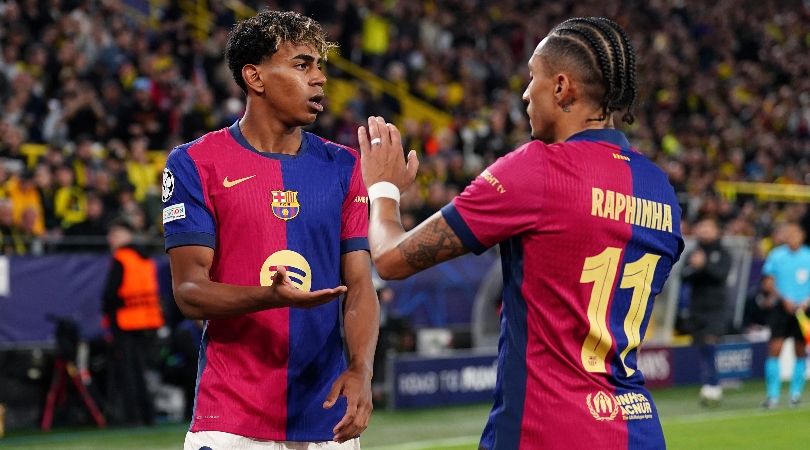5 things Chelsea fans can expect from Antonio Conte
On Monday it was announced that the Italy boss will take the reins at Stamford Bridge this summer. Greg Lea provides the lowdown…
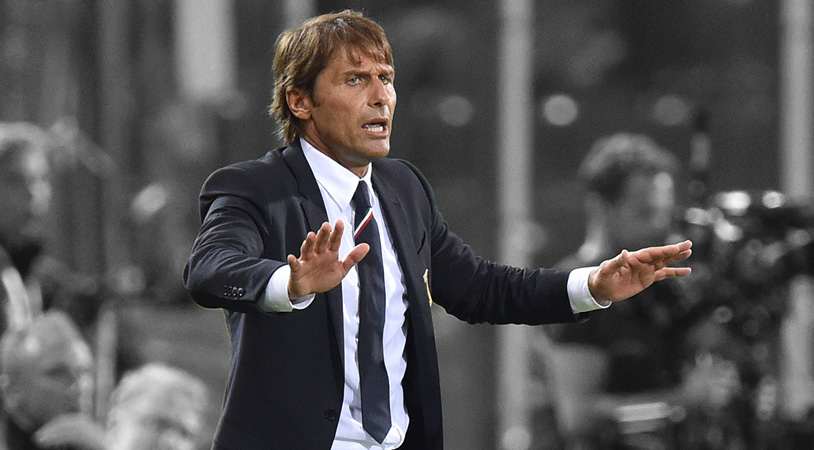
Former Juventus head coach Antonio Conte will be Chelsea’s 10th different boss in the Roman Abramovich era, but what will he bring to Stamford Bridge – and is he likely to be a success?
1. Intensity, intensity, intensity
Conte’s brought a new mentality to the club. He’s pushed us to sweat, to find strength and to undergo hard work
Conte admitted in his Italy resignation statement that he wanted to return to club management and be able to work with players on a daily basis. That will come as no surprise to anyone who followed his three-year tenure at Juventus, where he proved himself to be a relentless, intense and hands-on operator who demanded certain standards from his squad on both the training ground and the pitch.
“The secret of our success is the ambition our coach has,” said Gianluigi Buffon, who’s played under a fair few managers in his time, in 2012. “Conte’s brought a new mentality to the club. He’s pushed us to sweat, to find strength and to undergo hard work in order to cancel out the last two disappointing campaigns.”

The 46-year-old has reportedly been improving his English in the last few months. It’s a pretty safe bet that he’s already memorised the translations for ‘sacrifice’, ‘commitment’ and ‘work harder you miserable, good-for-nothing hobos’.
2. His way or the highway
There is little chance of Conte indulging players who he doesn’t think are onside with his methods, nor members of the Chelsea hierarchy who aren’t pulling in the same direction he has set.
Get FourFourTwo Newsletter
The best features, fun and footballing quizzes, straight to your inbox every week.
If you let him get on with things and enact his methods, you will have a team that plays attractive football and will, without doubt, be successful
“If he takes a job, any job, it will be on his terms,” Andrea Pirlo, whose career was revived by Conte at Juventus, said recently. “The players he wants to sign, those he wants to get rid of, the style he wants to play.
“If you sign him as your coach and then as the owner you want to start making decisions, he is not the coach for you. If you let him get on with things and enact his methods, you will have a team that plays attractive football and will, without doubt, be successful.”
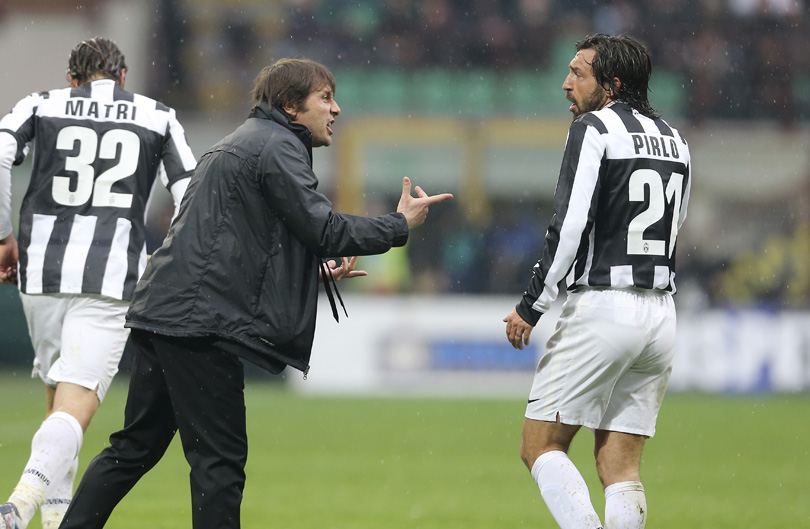
It’s likely that Conte will have a big say on which players remain and which are allowed to leave, but whether his demands for control will lead to a change in Chelsea’s management structure remains to be seen.
3. The 3-5-2 formation
No Premier League title-winning team has ever played with anything other than a back four
One of the key tenets of the coaching philosophy Conte will be preaching strict adherence to is the 3-5-2, a common configuration in his native Italy. English sides Manchester United, Tottenham, Liverpool, Southampton, Sunderland, Aston Villa, West Brom and West Ham have all used it at times this term, but Conte will still face scrutiny from supporters and the media if he sticks with the system he has used with Juventus and Italy in the past four years.
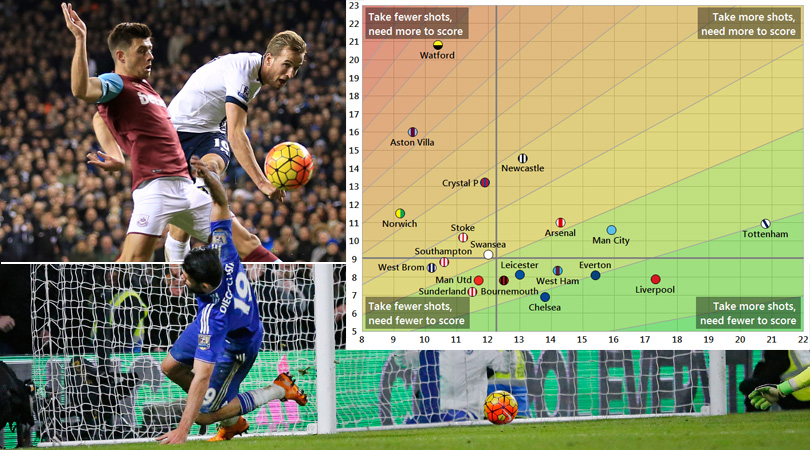
Infographic: Why Chelsea are the Prem's most efficient side, Spurs the biggest bullies
No Premier League title-winning team has ever played with anything other than a back four, and while Conte moving away from his favoured formation isn’t entirely out of the question upon arrival in England, the Italian’s dogmatic tendencies are likely to see him stick with what he knows.
4. European struggles?
Juventus may have dominated Serie A during Conte’s time in charge, but they were always a little underwhelming in European competition. In 2012/13, the Bianconeri topped a Champions League group containing Chelsea, Shakhtar Donetsk and Nordsjælland before beating Celtic 5-0 on aggregate in the last 16, but were then dumped out with relative ease by Bayern Munich in the quarter-finals.
The most popular theory as to why Juventus were unable to transfer their domestic dominance to the continental stage focused on Conte’s unwillingness to adapt
A year later, they failed to make it past the first hurdle, finishing third in Group B after taking only six points from six matches against Real Madrid, Galatasaray and Copenhagen. Entry into the Europa League followed and, with the final due to take place at Juventus Stadium, it was widely opined that the Italians would go all the way. Instead they were deservedly knocked out by Benfica in the semi-finals, with Juve unable to overturn a 2-1 first-leg deficit in the return game back in Turin.
The most popular theory as to why Juventus were unable to transfer their domestic dominance to the continental stage focused on Conte’s unwillingness to adapt his tactics. The 3-5-2 always seemed unsuited to European competition, where width is more common than on the peninsula. Quick switches of play routinely left his side exposed down the flanks, a weakness that Bayern Munich ruthlessly exploited through Arjen Robben and Franck Ribery in the pair’s quarter-final in 2013.
It probably didn’t help Conte’s cause that the more flexible Max Allegri took Juventus to the Champions League final in 2014/15 while chopping and changing formations throughout the campaign. Chelsea probably won’t be in Europe at all next year, but given that Conte may find himself out of a job if he fails to guide them back into it, it will be interesting to see whether he has learned from his Juventus side’s prior shortcomings.
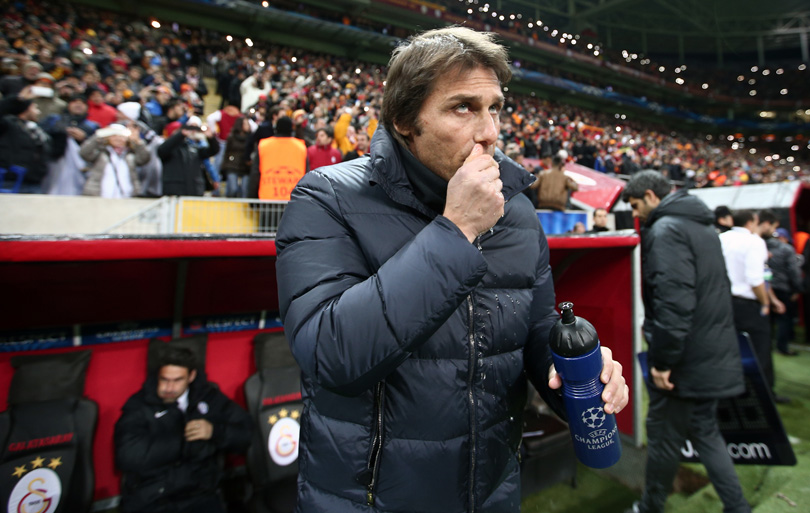
5. Mourinho Mk. II?
Both are self-assured, volatile and demanding, while they often use enemies – whether real or imagined – to try to build a siege mentality
There are clear similarities between Conte and Jose Mourinho, who enjoyed so much success in west London but departed under not one cloud but an entire rainstorm. Both are self-assured, volatile and demanding, while they often use enemies – whether real or imagined – to try to build a siege mentality and ferocious team spirit.
Perhaps, though, this is the perfect time for such a figure to take charge at Stamford Bridge. After 13 years of silverware and success, Chelsea are currently at their lowest ebb since Abramovich’s takeover and may now decide to abandon the hiring-and-firing culture and choose another path – just as they had intended to do with Mourinho until results forced a change.

Conte, moreover, has experience of reviving a fallen giant – not that one bad season makes Chelsea that just yet – with Juventus finishing seventh in 2009/10 and 2010/11 before he led them to three successive league titles, going through one campaign unbeaten and smashing the 100-point barrier in another.
Whereas Mourinho’s comparable personality ultimately proved his undoing, the situation he has inherited means Conte’s could be exactly what Chelsea need right now.
Greg Lea is a freelance football journalist who's filled in wherever FourFourTwo needs him since 2014. He became a Crystal Palace fan after watching a 1-0 loss to Port Vale in 1998, and once got on the scoresheet in a primary school game against Wilfried Zaha's Whitehorse Manor (an own goal in an 8-0 defeat).

